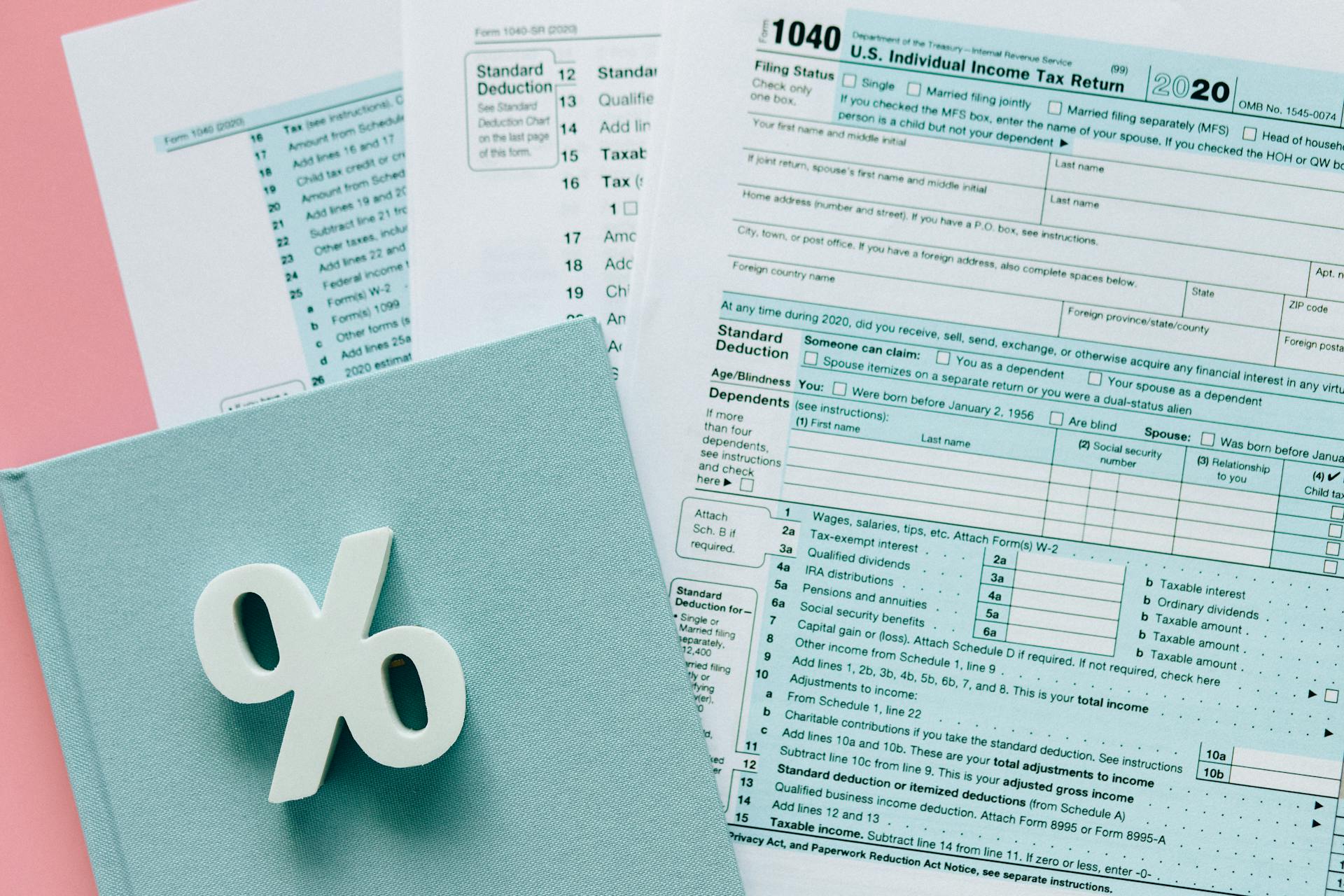
Muni bond offerings can be a bit overwhelming, but don't worry, we've got you covered. Muni bonds are issued by local governments and other public entities to finance various projects, such as building schools and roads.
A key aspect of muni bond offerings is their tax-exempt status. This means that the interest earned from muni bonds is not subject to federal income tax, and in some cases, state and local taxes as well. Muni bonds are typically issued with a fixed interest rate, which is paid out periodically, usually semiannually.
Muni bonds are often used to finance large-scale projects, such as transportation infrastructure and public buildings. For example, a city might issue muni bonds to finance the construction of a new highway or a public library.
A fresh viewpoint: Church Finance Bonds
Types of Muni Bonds
Muni bonds come in three main varieties: general obligation, revenue, and conduit. Each type has its own unique characteristics and benefits.
General obligation bonds are issued by governmental entities and are backed by the full faith and credit of the issuer. This means that the issuer has the power to tax residents to pay bondholders. Some GO bonds are backed by dedicated property taxes, while others are payable from general funds.
Revenue bonds, on the other hand, secure principal and interest payments through the issuer or via sales, fuel, hotel occupancy, or other taxes. This type of bond is often used to finance specific projects, such as toll roads or bridges, airports, electric and water utilities, public or private colleges, and hospitals.
Conduit bonds are a type of revenue bond where a third party covers interest and principal payments. This is often used when a municipality is a conduit issuer of bonds on behalf of a private entity, such as a healthcare facility or affordable housing project.
Here's a quick summary of the main types of muni bonds:
Benefits and Risks
Municipal bonds may have lower interest rates than riskier investments, but they offer stability for your capital with low default rates. Interest from munis is also generally exempt from federal taxes, making it an attractive investment.
Some municipal bonds, such as high yield municipal bonds, may be risky. Investors need to review the specifics of the bonds they are considering or already own to evaluate their risk. Credit/default risk, interest rate risk, call risk and reinvestment risk are among the main risks associated with investing in municipal bonds.
Check this out: Muni Bond Interest
To evaluate a municipal bond, conduct your own due diligence by checking its credit rating, yield and maturity date. A credit rating can show an entity's financial strength and ability to meet principal and interest payments on their debts.
Here's a rough guide to the relative safety of different types of investments:
Keep in mind that no investment is risk-free, including munis. Their values will go up and down depending on the market, just like any bond investment.
Related reading: Are Muni Bonds a Good Investment
Tax Benefits of
Municipal bonds are generally exempt from federal taxes, which can be a significant advantage for investors in high tax brackets.
Interest from munis is also exempt from state taxes in some cases, making it an attractive investment for those who reside in the state where the bond was issued.
The tax benefits of municipal bonds can even outweigh the lower interest rates they offer compared to corporate bonds. According to Charles Schwab, a muni bond yielding 3.3% may yield more after taxes than a fully taxable corporate bond yielding 4.7% for investors in the 32% and above tax brackets.
Not all municipal bonds are tax-exempt, however. The issuer must meet specific requirements in the federal income tax code for the interest to be exempt from federal income taxes.
Additional reading: Who Does Out of State Bonds
Risks of Investing
Municipal bonds are not completely risk-free, despite their reputation as a safe investment. In fact, some municipal bonds, such as high yield municipal bonds, may be riskier than others.
You can lose money on a municipal bond, just like any other investment. Its value can go up and down depending on the market.
A small municipality with a large amount of debt is less safe than a well-capitalized state like Wyoming. This is because the municipality may struggle to meet its debt obligations.
The main risks associated with investing in municipal bonds include credit/default risk, interest rate risk, call risk, and reinvestment risk. These risks can affect the value of your investment.
To evaluate the risk of a municipal bond, check its credit rating. A credit rating can show an entity's financial strength, including its ability to meet principal and interest payments on its debts.
Here are some key risks to consider when investing in municipal bonds:
By understanding these risks, you can make a more informed decision about investing in municipal bonds.
Investing in Muni Bonds
Municipal bonds are often considered a safe investment, but it's essential to remember that the return of principal and interest is not guaranteed. Some municipal bonds, like high-yield municipal bonds, may be riskier than others.
Investors need to review the specifics of the bonds they're considering or already own to evaluate their risk. Some of the main risks associated with investing in municipal bonds include credit/default risk, interest rate risk, call risk, and reinvestment risk.
Most municipal bonds are issued in $5,000 increments, making it a significant minimum investment. However, some exchange-traded funds (ETFs) and mutual funds allow investors to purchase bond fractions.
No investment is risk-free, including munis. Their values will go up and down depending on the market, just like any bond investment.
Why Invest?
Investing in muni bonds can be a smart move for many people. Muni bonds are considered a safe investment, with a low rate of default compared to corporate bonds.
According to the Municipal Securities Rulemaking Board, referencing data from Moody's Investor Service, there was a 0.09% default rate on investment-grade munis between 1970 and 2022. This is significantly lower than the 2.25% default rate for investment-grade corporate bonds.
Muni bonds also offer tax benefits, as you pay no federal taxes and sometimes no state taxes. This can lead to higher after-tax yields compared to taxable bonds.
If you're in a high income bracket, investing in munis now is a good idea. Many municipalities are in good financial shape, and as the Federal Reserve begins to lower interest rates, investors will likely shift out of short-term Treasuries and into varying types of bonds with longer maturities to lock in yields.
Here are some reasons why investing in munis can be beneficial:
- Low rate of default
- Tax benefits, including no federal taxes and sometimes no state taxes
- Higher after-tax yields compared to taxable bonds
- Good financial shape of many municipalities
How to Buy
To buy municipal bonds, you can start by investing a minimum of $5,000, although some exchange-traded funds and mutual funds may allow you to purchase bond fractions.
You can buy municipal bonds through various channels, including banks, brokers, bond dealers, and online platforms. Most financial professionals recommend using a brokerage firm or investment advisory service to buy municipal bonds.
Using a brokerage firm can be a good option, as they will accept your order to buy, sell, and hold the bond, and may also monitor the investment for you. However, be prepared for mark-up or mark-down and transaction-based fees, as well as a sales charge for buying and selling the bond if it's part of a mutual fund or ETF.
Alternatively, you can buy municipal bonds through a separately managed account (SMA), where a professional money manager will execute the trade for you and charge an asset-based fee. This option may be more suitable for larger investments or those who want more personalized management.
Buying municipal bonds directly can be complicated and expensive, so most financial professionals don't recommend it.
Intriguing read: How Do I Buy Convertible Bonds
Muni Bond Offerings
Muni bonds are debt securities issued by state and local governments to fund day-to-day obligations and finance capital projects, such as building schools, highways, or sewer systems.
Municipal bonds can be thought of as loans that investors make to local governments, used to fund public works like parks, libraries, bridges, and roads. These loans can have long tenures, often ranging from a few years to several decades.
Muni bonds frequently have low, fixed rates and generate proceeds used by state or local governments for capital expenditures on public and economic development projects. They can also provide tax-free interest, making them an attractive investment option for individuals in high tax brackets.
Here are some key types of muni bonds:
- General obligation (GO) munis: provide cash flows generated from taxes collected on a project or from general funds of the governmental agency.
- Revenue munis: return cash flows generated from the project itself.
What Is a Bond?
A municipal bond is a type of debt security issued by local, county, and state governments to fund capital expenditures like building schools, highways, or bridges.
They act like loans, with bondholders becoming creditors who are promised interest on their principal balance, repaid by the maturity date.
Municipal bonds are often exempt from most taxes, which makes them attractive to people in higher income tax brackets.
Munis are debt securities issued by states, cities, counties, and other governmental entities to fund day-to-day obligations and finance capital projects.
They are exempt from federal taxes and sometimes state taxes, making them a relatively safe investment.
However, an investor needs to assess a muni before investing in it, as municipal bonds have different credit qualities based on the underlying health of the municipality.
A unique perspective: Muni Bonds
How They Work
Muni bonds work by allowing you to lend money to a local government or other entity in exchange for regular interest payments and the return of your principal investment. This is a type of loan, where you become a creditor to the bond issuer.
The bond issuer uses the money to fund capital projects, such as building schools, highways, or sewer systems. In return, you receive a fixed rate of interest, usually paid semi-annually, and the promise that your principal will be repaid on the maturity date.
Maturities can range from one to 30 years, so you can choose a term that fits your investment goals. Some bonds are short-term, due in one to three years, while others are long-term, with maturities more than a decade away.
There are two main types of municipal bonds: general obligation and revenue bonds. General obligation bonds are backed by the full faith and credit of the issuer, which means they have the power to tax residents to pay bondholders. Revenue bonds, on the other hand, are backed by revenues from specific projects, such as highway tolls or lease fees.
Here are some key features of municipal bonds:
- They often exempt the shareholder from gross income for federal income tax purposes.
- They frequently have long tenures.
- They often have low, fixed rates.
- They generate proceeds that are frequently used by state or local governments or conduit borrowers for capital expenditures for public and economic development projects.
Municipal bonds are considered a relatively safe investment, but it's essential to assess the credit quality of the issuer before investing. You can check the credit rating, which shows the entity's financial strength and ability to meet principal and interest payments.
Conduit
Conduit bonds are issued through third-party entities that act on behalf of the actual borrowers, typically private nonprofit entities. This can include organizations like nonprofit colleges and hospitals.
You might be promised a return on your investment, but if the conduit borrower fails to make a payment, you could be left without one.
Entities That Administer Green
Local governments frequently issue bonds to finance capital projects, such as the construction of new public facilities. These bonds can also be used to fund energy efficiency retrofits or improvements to existing buildings.
Local and regional authorities, like housing or transit authorities, issue bonds for capital projects. They may develop green bond programs to issue green bonds alongside general, tax-exempt municipal bonds.
State authorities issue tax-exempt bonds for public or economic development projects. They may also develop green bond frameworks and programs to allow for the issuance of green bonds.
Third-party and nonprofit organizations can implement clean energy programs after a bond is issued. This can help support local energy initiatives and promote sustainability.
Here are some entities that administer green bonds:
- Local governments
- Local and regional authorities (e.g. housing or transit authorities)
- State authorities
- Third-party and nonprofit organizations
Muni Bond Features
Muni bonds often exempt the shareholder from gross income for federal income tax purposes. They frequently have long tenures, making them a viable option for long-term investors.
Low, fixed rates are a common feature of municipal bonds. This can be a attractive option for investors looking for predictable returns.
Take a look at this: American High Income Muni Bond Fund a
Municipal bonds are often used by state or local governments or conduit borrowers to fund public and economic development projects. The proceeds from these bonds are frequently used for capital expenditures such as building parks, libraries, bridges, and roads.
Here are some key features of municipal bonds:
- They often exempt the shareholder from gross income for federal income tax purposes.
- They frequently have long tenures.
- They often have low, fixed rates.
- They generate proceeds that are frequently used by state or local governments or conduit borrowers for capital expenditures for public and economic development projects.
Bond Features
Municipal bonds often exempt shareholders from gross income for federal income tax purposes, making them a tax-free investment option for many individuals. This is especially attractive for those in high tax brackets.
Municipal bonds frequently have long tenures, which can range from a few years to several decades. This is because they are often used to fund long-term infrastructure projects.
Interest paid on municipal bonds is often tax-free, which is a major draw for investors. This means you can keep more of your investment earnings, rather than sending a portion of them to the government in taxes.
There are two main types of municipal bonds: General Obligation (GO) munis and Revenue munis. GO munis provide cash flows generated from taxes collected on a project, or from general funds of the governmental agency. Revenue munis return cash flows generated from the project itself.
Here's a breakdown of the main types of municipal bonds:
Beware of bonds with call features, as they can appear attractive at first but end up costing you in the long run.
Green Key Features:
Green bonds are a type of municipal bond that specifically supports environmental or clean energy projects. They have some unique features that set them apart from other types of bonds.
One key feature of green bonds is that they are municipal bonds with the additional use of proceeds language specifying how the financing will support environmental or clean energy projects.
Green bonds often exempt the shareholder from gross income for federal income tax purposes, which can be a big plus for investors.
Here are some key features of green bonds at a glance:
- They are municipal bonds with the additional use of proceeds language specifying how the financing will support environmental or clean energy projects.
- They often exempt the shareholder from gross income for federal income tax purposes.
- They align with guidelines set forth in ICMA’s Green Bond Principals and may meet the more rigid standards developed by CBI that require third-party verification.
Frequently Asked Questions
Why do rich people invest in municipal bonds?
Rich people invest in municipal bonds because they offer attractive yields that are often tax-exempt, making them a compelling choice for those in higher tax brackets. This can help them maximize their returns while minimizing their tax liability.
Sources
- https://www.blackrock.com/us/financial-professionals/investments/products/municipal-bonds
- https://www.msrb.org/Municipal-Bond-Basics
- https://www.epa.gov/statelocalenergy/municipal-bonds-and-green-bonds
- https://www.investopedia.com/terms/m/municipalbond.asp
- https://www.forbes.com/sites/investor-hub/article/what-is-municipal-bond-and-how-to-buy-this-kind-of-security/
Featured Images: pexels.com


